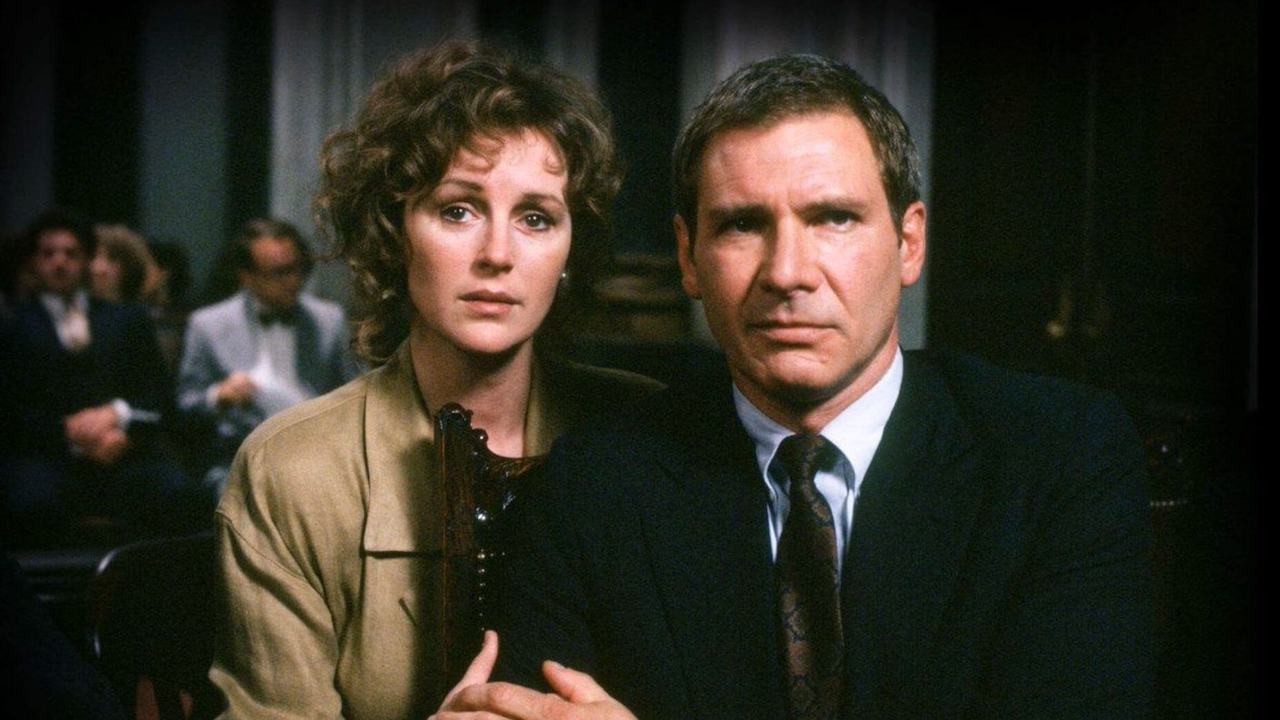In the 1990 film Presumed Innocent, Harrison Ford’s Rusty Sabich is an ethical Assistant District Attorney—one of those rare genuine good guys just trying his best to do the right thing, to use his power to improve the world, a family man with eyes heavy from the weight of life and the horrible things that can happen in it—and he’s been accused of murdering a female colleague. It’s a grisly sight, a sex crime, the lifeless body bound in an intricate system of ropes and bludgeoned with one decisive, impassioned swing, a savage death for a woman we don’t know, and for whom we grieve, since we believe in innocence until proven otherwise. She’s a victim; what else is there to know?
We immediately assume that Rusty is innocent because he’s played by Harrison Ford, the epitome of the American hero, having saved the world from Nazis twice; but director Alan Pakula and co-writer Frank Pierson, adapting Scott Turrow’s best-selling airport novel with somber sincerity, unveil unexpected sordid secrets with care. Not quite gentle, because it is a dark story of obsession and deceit with no happiness to be found anywhere, and nothing is sweetened or cushioned, but carefully, rhythmically edited and suffused with the browns and muted yellows of courtrooms and knavish sunshine by cinematographer Gordon Willis, an essential consort to Francis Ford Coppola and Pakula (Willis uses those shadows that one associates with a sagacious Marlon Brando petting a cat in a warm-dark room sparingly but effectively here—Ford’s shrouded eyes lend an air of unprecedented menace, as if the beloved actor was capable of such carnality, such violence).
Nothing is arbitrary, every detail considered with respect for the complications of the characters and the intelligence of the audience. And the sex scene is pretty steamy, too—the first time Ford was shown to be a sexual being rather than a man you like to imagine being naughty. And then Ford ends up a cuckold. He’s pitiful. We want Ford to be cleared because we think he’s innocent; but as each secret is exhumed, laid out before us like remnants of a rotting corpse, our trust decays a little bit more until we have to question if his being declared innocent is what we really want. Justice for a woman who may be more twisted and insalubrious than we thought—some may even feel a quake of shame when they think, “Did she deserve it?”—or a man of incredible charisma: which is, for us, the viewers, the right choice?
Presumed Innocent is the apogee of mainstream courtroom drama, an eloquent, earnest staging of unpleasant material, with Ford using his fame and ubiquitous adoration to usurp our expectations of his indelible heroism to beguile and possibly betray. He even curses! Remember, this was 1990, and it was awfully hard imagining Indiana Jones as a bad guy. (This film is almost certainly why Ford was cast in The Fugitive, the story of an explicitly innocent man unfairly condemned.) Deeply pained and deeply empathetic, even romantic, Presumed Innocent is a film of people in crisis searching for catharsis, lying to live, and sexual politics that may seem antiquated, but which slowly, subtly open up, like someone making a terrible confession to their spouse, and reveals the heart of a tragedy when we’re given an answer to the film’s mystery—not just the “who,” but the “why,” an explanation that’s trembling with loathing (for self and for other), calm in its cruelty.
Presumed Innocent is an eloquent staging of unpleasant material, with Ford using his ubiquitous adoration to usurp our expectations of his indelible heroism to beguile and possibly betray. He even curses!
Pakula crafts a killer who did what they felt they had to do in order to make someone love them again: murder in the name of matrimony. The slow zoom away from Ford in the tenebrous basement would be a great ending, and Pakula’s painful patience makes you think that this is it: Ford killed her. Then the offscreen admission, “I did it,” shatters—with stentorian serenity—the quiet, gorgeous gloom. The final conversation, intoned matter-of-factly, ends with Ford’s single finest line reading, the curt finality of his one-syllable utterance (“Saved?”) with such vitriol, with quivering anger reddening his tear-glistened face is the perfect ending, a repudiation of the romantic salvation that motivated the film’s central act of violence.
All those sad, could-be great men, and the judge, the suicidal drunk, are saved by a man who will subsequently fall into the same situation with the same woman, whose venereal stratagem for career advancement has a corrosive effect on the lives of the men she uses. (I just love Paul Winfield and the elocution with which he scolds the lawyers and elucidates for the jury, his dignity and his principles.) Everyone’s always telling partial truths in and out of the courtroom. With traditional, even simple staging of shots and scenes, Pakula and Willis make a licentious story of murder and marriage respectable, which was unfairly dismissed by critics as being shallow.
Confession of obsession. Sex and the system. Legal framework and an ignored wife mired in a sexless marriage watching her husband pine over a beautiful, beguiling egotist. A series of men broken by the harsh banalities of life and felled by the same wicked vixen who is, remember, working for the prosecution. The final 20 or 30 minutes, as the last lingering layers are peeled back and the tales of men and women in pain proliferate, are as good as anything from that fabled era of New Hollywood, an American tragedy that only gets better with age.







